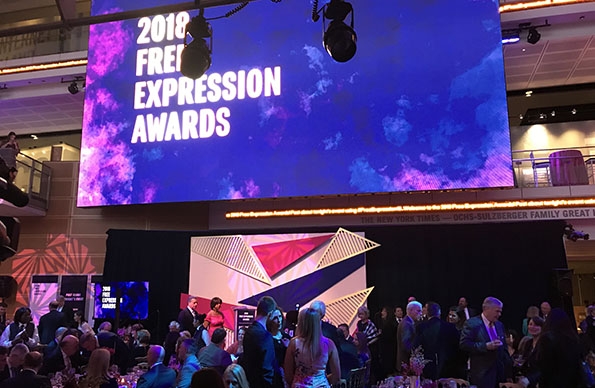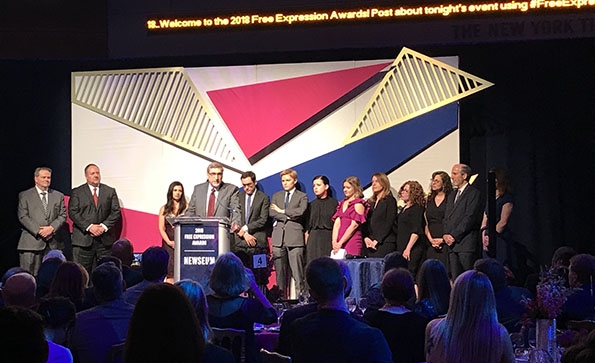The Newseum celebrated champions of free speech with third annual awards ceremony.

Photo by Catherine Douglas Moran.
The 2018 Free Expression Awards gathered a large crowd who came to see journalists, two Olympic athletes, an editor and a chairman receive recognition for their free speech efforts. Guests enjoyed a cocktail reception and gourmet dinner by Wolfgang Puck Catering, followed by a dessert reception at the Newseum on April 17. At the start of the awards ceremony, news of the death of former U.S. first lady Barbara Bush broke, with a moment of silence observed.
Former NBC News Anchor and Correspondent John Seigenthaler hosted. Presenters included former professional basketball player Kareem Abdul-Jabbar, ABC News Correspondent Gloria Riviera and former Associated Press editor Kathleen Carroll. The first award of the night went to The New York Times Company’s Chairman Arthur O. Sulzberger, Jr., who received the Lifetime Achievement Award.
“The highest and noblest role of a free press is holding power to account,” he said in his acceptance speech, saying that in 2016 when Donald Trump came to The New York Times for an interview with journalists, Sulzberger showed the then-president-elect a note from Richard Nixon that said, “Some read it and like it. Some read it and don’t like it. But everybody reads it.”
Awards went to Laurent “Riss” Sourisseau, editor of Charlie Hebdo, Olympians John Carlos and Tommie C. Smith and more than a dozen journalists who investigated sexual misconduct in the workplace. Riss was present when a terrorist attack in 2015 killed 12 at the headquarters of the French satirical paper. Smith and Carlos, who won gold and bronze in the 200-meter sprint in the 1968 Olympic Games, made a political demonstration for human rights by each raising a gloved black fist at the medal ceremony.
In his acceptance speech Carlos called out news coverage about the 1968 protest, saying The New York Times “had no consciousness for people of color.
” Carlos used his speech to remind “all of the white people in the audience” to not whitewash history by ignoring perspectives in journalism.

The awarded journalists for covering sexual misconduct in the workplace (Photo by Catherine Douglas Moran.)
Marisa Kwiatkowski, one of the journalists from The Indianapolis Star recognized for investigating sexual misconduct, said the scope of backgrounding coaches from all over the country was challenging, but continual, clear communication with sources helped her form trust and build relationships with people who came forward to share their stories. Kwiatkowski was a part of the team that produced an investigative series revealing that USA Gymnastics have followed a policy of not reporting all alleged sexual abuse against its coaches.
Her fellow reporters from the paper who also received the award included Mark Alesia, Steve Berta and Tim Evans.
“I think that any time a survivor is willing to share his or her story, it gives people a level of comfort and ability to come forward with their own story.
You’re seeing that nationally. Hopefully that continues,” she told us. At the end of the day, Kwiatkowski said it was all about getting it right. “It was about publishing when it was ready,” she said, adding that the series did not have hard deadlines for the articles.
The Washington Post’s Paul Farhi, who wrote about harassment allegations against a top NPR editor, told us that the stories about sexual harassment and assault are nothing new, but the societal dialogue has changed. Talking about his reporting on Bill Clinton and Paula Jones, who sued Clinton for sexual harassment, he said “that was a completely different era. It was pretty much the same story, but we didn’t have the same kind of cultural conversation, the same kind of cultural awareness we have now.
We should have, but we didn’t.”
Farhi joined his Post colleagues Amy Brittain, Irin Carmon, Alice Crites, Stephanie McCrummen and Beth Reinhard in sharing the award for sexual misconduct reporting.
Reporting by The New Yorker’s Ronan Farrow and The New York Times’ Michael Schmidt and Emily Steel were also awarded.

Photo by Catherine Douglas Moran.




